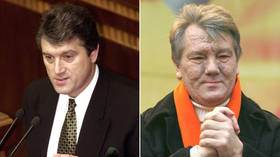Poisoning that shaped 15 years of Ukraine politics never happened – prosecutor on Yushchenko case
Published time: 30 Jul, 2019 19:34Edited time: 31 Jul, 2019 10:18

Former president of Ukraine Viktor Yushchenko was not poisoned during the 2004 campaign, Ukraine’s chief military prosecutor said in an interview, casting fresh doubts on the narrative shaping Kiev politics for the past 15 years.
At the time, Yushchenko led a Western-backed coalition against the incumbent Prime Minister Viktor Yanukovych, whom they accused of being “pro-Russian.”His disfigurement from what he called dioxin poisoning led to an outpouring of popular support and street protests, later dubbed the ‘Orange Revolution.’ Under that pressure, the Ukrainian supreme court annulled the run-off election Yanukovich had won, delivering Yushchenko the presidency after a revote.
This week, however, the deputy Prosecutor-General and chief military prosecutor of Ukraine since 2014, Anatoly Matios, revealed in an interview that his investigators found no evidence of a poisoning.
ALSO ON RT.COMEU writes Ukraine's eulogy
Various Ukrainian officials have cast doubts on the story ever since, pointing out that Yushchenko never allowed a second blood test that would confirm the results, and speculating that the original test was tampered with. Yushchenko has since made a near-complete recovery.
His government was not so fortunate. Its policies proved unable to deliver on the promises of economic prosperity, made the endemic corruption worse and fueled nationalism and intolerance between Ukraine’s diverse communities. Eventually, Yushchenko fell out with his coalition partner Yulia Tymoshenko, who went on to lose the 2010 election to Yanukovych. The former president went from widespread popularity to obscurity, with his party getting less than 2 percent of the parliamentary votes in 2012.
ALSO ON RT.COM'F**k the EU': Snr US State Dept. official caught in alleged phone chat on Ukraine
Using the same methods as the original Orange Revolution, another coalition of opposition politicians was assembled in 2013 to pressure Yanukovych into abandoning a free trade pact with Russia for a restrictive trade deal with the EU. The protests, backed by the US and several EU powers, escalated into street violence and culminated in a violent coup in February 2014.
The coup government then tried to crush dissent with military force, leading to the separation of Crimea and the ongoing civil war between Kiev and the two eastern provinces, Donetsk and Lugansk.

0 Comments:
Post a Comment
Subscribe to Post Comments [Atom]
<< Home